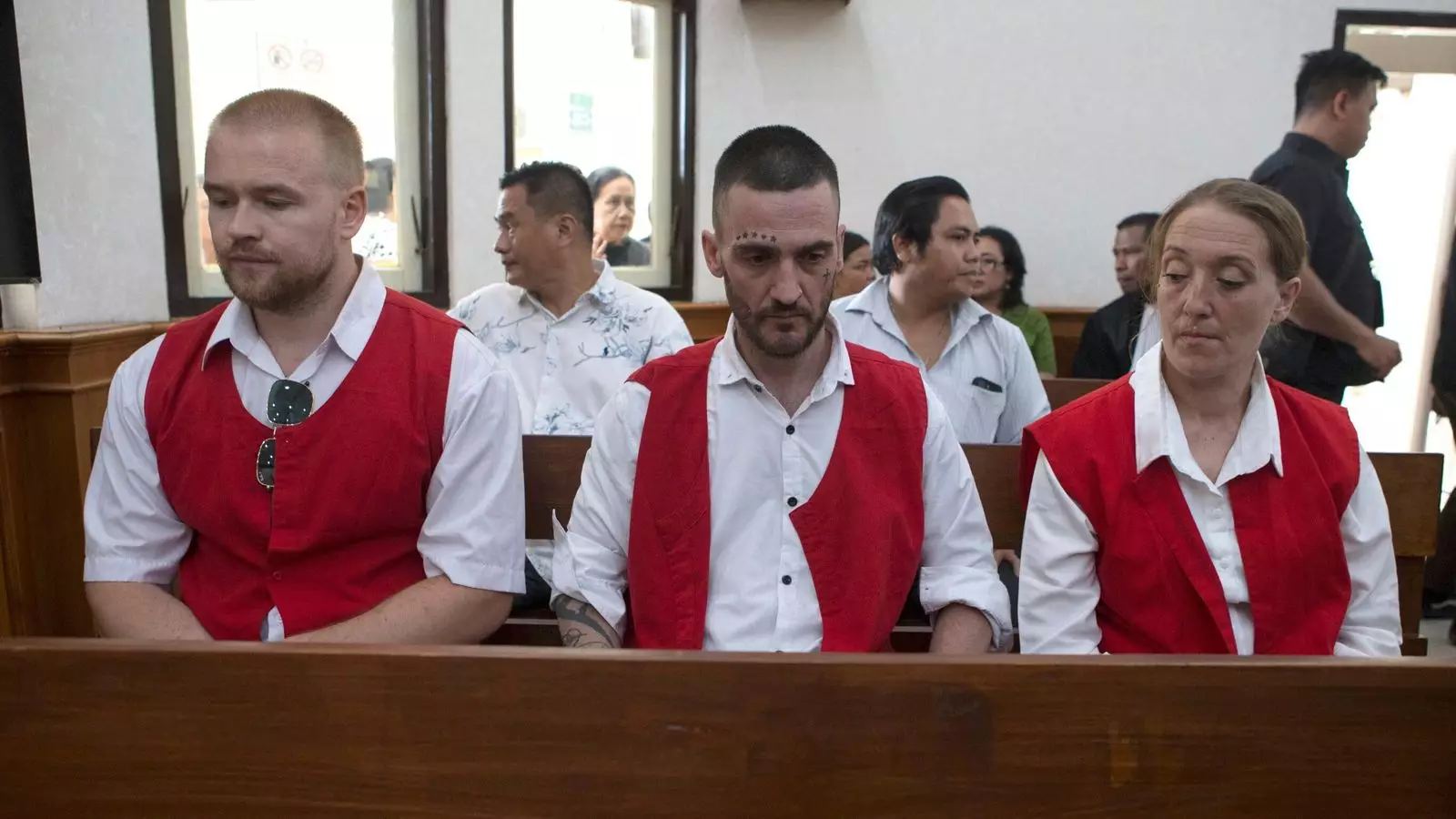The arrest of three Britons for drug smuggling in Bali not only sends shockwaves through the expat community but also brings to light the harsh realities of Indonesia’s draconian drug laws. Jonathan Christopher Collyer, Lisa Ellen Stocker, and Phineas Ambrose Float stand at the precipice of a fate that many have faced before them: the death penalty. Their case serves as a chilling reminder of the perils associated with drug trafficking in a country known for its unforgiving stance against drug-related crimes.
A Glimpse into a Troubling Trend
The recent charges against the three Britons underscore an alarming trend: Bali is becoming increasingly exploited by international drug syndicates. The trio reportedly managed to smuggle cocaine into the island on two prior occasions, with customs officers catching up to them only during their third attempt. This history not only puts their lives in jeopardy but also speaks to the effectiveness of law enforcement in cracking down on drug operations. Yet, it raises uncomfortable questions about why these individuals took such monumental risks in a country notorious for its harsh drug laws.
Indonesia’s strict laws, including the threat of execution for drug trafficking, starkly contrast with those in many Western nations. While Western society has grown more liberal in its approach to drug use, treating it as a public health concern rather than a moral failing, Indonesia clings to a rigid and punitive system. The complexities of balancing individual rights with societal protection seem lost in translation. And yet, the allure of the drug trade persists, revealing a sad reality: vulnerability is often masked by greed, ignorance, or desperation.
Indonesian Law: A Double-Edged Sword
Critics of Indonesia’s punitive drug laws argue that they do little to curb drug trafficking while disproportionately affecting low-level offenders. With approximately 530 people, including 96 foreigners, on death row for drug offenses, it is clear that the state remains unyielding. The case of Lindsay Sandiford, a British national who has languished on death row since 2012 for smuggling 3.8 kg of cocaine, reflects the dire long-term repercussions of being ensnared by these unforgiving regulations.
The death penalty as a deterrent appears more symbolic than effective. As emerging reports indicate, international drug trafficking operations continue to thrive in Indonesia, driven largely by the demand from local youth. In a culture increasingly open to various substances, the connection between the laws and the reality on the ground remains tenuous. Critics would argue that instead of punishment, a more nuanced approach focusing on education, rehabilitation, and substance abuse support could yield better outcomes.
The Role of International Drug Syndicates
The reliability of information from the police highlights a growing concern: the infiltration of international drug syndicates aiming to exploit Indonesia’s youth. If the data is to be believed, not only are local communities at risk, but so are unsuspecting tourists. The high-profile arrests serve as a stark warning, yet they also reveal an underlying vulnerability in Indonesia’s legal and social framework regarding drug enforcement. Police have increasingly pointed to the manipulation of young minds as a major factor in the rise of drug use, often finding themselves trapped in a cycle of enforcement that fails to address the core issues.
Consider the situation faced by Thomas Parker, who received a comparatively lenient sentence of 10 months in jail. Having successfully argued that he was a victim of circumstances, the decision to downgrade his charges highlights the inconsistencies in how justice is served. A package containing MDMA led to accusations of drug trafficking, but through prolonged deliberation and evidence, Parker was able to escape the harshest penalties reserved for those like Collyer, Stocker, and Float, who find themselves hopelessly entangled in a web of despair.
In the Crosshairs of Public Sentiment
Public opinion on drug smuggling and the death penalty in Indonesia is far from uniform. While many support stringent laws to combat drug trafficking, others plead for a reevaluation of the death penalty as a viable punishment. As images of individuals awaiting their fate circulate in the media, it becomes evident that the human stories behind these statistics often get lost. Are these individuals merely pawns in a larger game played by ruthless traffickers, or do they embody a deeper societal malaise?
The case of the Britons in Bali elicits both sympathy and outrage, a sentiment mirrored in an international discourse on drug-related justice. As the trial continues, it remains to be seen how the judges will balance the black-and-white nature of legal statutes against the grey moral complexities presented by individual circumstances.
Indonesia’s war on drugs paints an unsettling portrait, where lives hang in the balance against a backdrop of international intrigue and personal culpability. In this environment, the stakes couldn’t be higher.

Leave a Reply